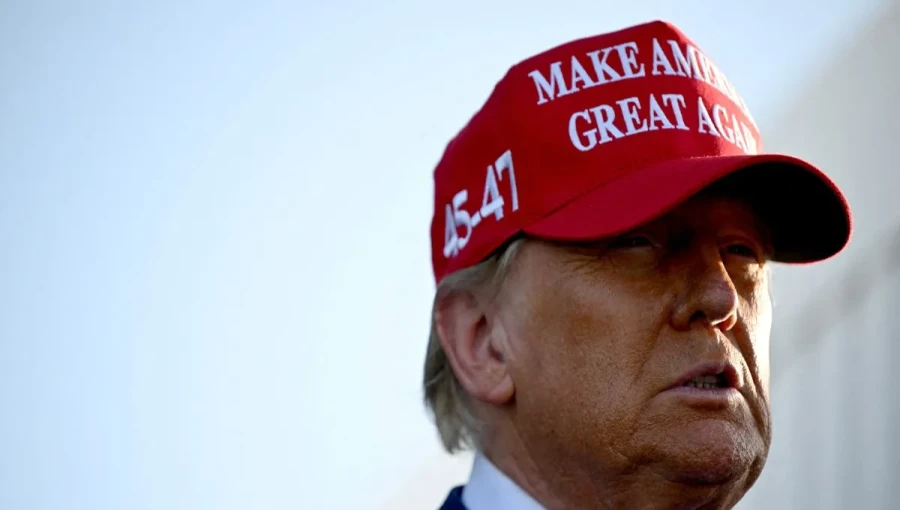Dec 02, (V7N) - On Monday, European stock markets experienced a downturn, with the Paris CAC 40 index slipping by 1.1% to 7,151.18 points, signaling caution among investors. This negative trend was primarily driven by political instability in France and concerns surrounding the country’s controversial budget proposal. The French Prime Minister, Michel Barnier, is set to present a social security financing plan, which has faced significant opposition across the political spectrum, particularly from Marine Le Pen’s far-right National Rally (RN) party. The proposal includes contentious elements, such as planned cuts to employer social contributions, a partial end to inflation-indexing of pensions, and a less generous prescription drug reimbursement policy. These aspects have sparked widespread dissent from both left-wing parties and the far-right, which are united in their opposition to Barnier’s proposals.
Further complicating matters, Barnier's minority center-right government does not hold a majority in the French parliament. Consequently, Barnier may resort to using his executive powers to push the legislation through without a vote, a move that could trigger a vote of no confidence within days. If this occurs, the far-left and Le Pen’s RN have indicated that they would unite to oust the government. The resulting political uncertainty has weighed heavily on the euro, which remains stuck at 14-month lows against the US dollar. As French markets grappling with these concerns, the broader European stock indices were also affected, contributing to the downward movement in regional stock exchanges.
Alongside Paris, other major European markets also saw declines. London’s FTSE 100 dropped slightly by 0.1% to 8,278.15 points, and Frankfurt’s DAX fell by 0.2% to 19,580.45 points. Investors appear to be cautious as they await the developments of the political situation in France, which could have a cascading effect on the overall stability of the European Union. Consequently, market participants are staying on edge, keeping a close eye on the political landscape and the potential risks associated with any instability that could arise.
Stellantis CEO Resignation Contributes to Decline in Auto Stocks
Among the significant movements in the European market on Monday, Stellantis, the multinational automotive company that owns well-known brands such as Jeep, Peugeot-Citroen, and Fiat, saw its stock fall by more than 7% following the unexpected resignation of Carlos Tavares, the company’s long-serving CEO. The sudden departure of Tavares, who had been at the helm of Stellantis since its creation in 2021 through the merger of PSA Group and Fiat Chrysler Automobiles, has raised concerns about the future direction of the company. Tavares was widely regarded as the architect of Stellantis' growth strategy, and his resignation leaves a significant leadership gap, triggering uncertainty among investors.
This event added to the negative market sentiment in Europe, where stocks across various sectors are under pressure. Tavares’ resignation reflects broader challenges in the automotive sector, where companies face growing pressure to transition to electric vehicles (EVs) while grappling with supply chain disruptions, labor unrest, and regulatory challenges. Stellantis has been at the forefront of the industry’s shift towards EVs, and the absence of Tavares at this critical juncture raises questions about the company’s ability to maintain its competitive edge in a rapidly evolving market.
In addition to concerns about leadership, Stellantis’ financial performance may come under scrutiny in the coming months, especially as competitors in the automotive sector continue to push for greater market share in the burgeoning EV market. These concerns, coupled with the broader European market’s downturn, have contributed to the company’s declining stock price.
Resilient Performance in Asian Markets Amid Optimistic Economic Indicators
In contrast to the negative sentiment in Europe, Asian stock markets saw positive performance on Monday, fueled by encouraging economic data and optimism following record highs on Wall Street. In particular, the Dow Jones and S&P 500 indices in the United States finished at record levels in the previous trading session, boosting investor confidence globally. This optimism carried over to major Asian stock markets, including Hong Kong, Shanghai, Sydney, Seoul, and Singapore, which all experienced gains.
The Hang Seng Index in Hong Kong rose by 0.7% to 19,559.00 points, while the Shanghai Composite increased by 0.9% to 3,355.15 points. Additionally, Sydney’s market and other major indices in Seoul, Taipei, Manila, and Jakarta also posted positive performances, suggesting that Asian investors remain cautiously optimistic despite the challenges posed by global economic uncertainties.
A key factor driving the positive performance in Asia was the release of strong economic data from China, which showed better-than-expected results for November manufacturing activity. The Purchasing Managers Index (PMI) for China expanded at a faster pace than analysts had anticipated, suggesting that the country’s prolonged economic slowdown may be easing. This data provided some relief to global markets, as China remains the world’s second-largest economy and a significant driver of global trade and demand.
The improvement in China’s PMI figures is attributed to the government’s continued supportive policies, which were unveiled in late September to stimulate growth. Analysts have pointed to these policies as crucial in helping China’s manufacturing sector rebound from the effects of the global slowdown, and further policy easing is expected in the coming months. Additionally, there is growing optimism that the Chinese government will continue to roll out further stimulus measures to bolster the economy, particularly amid weaker external demand and ongoing global trade tensions.
US Tariff Concerns and Trade War Fears
While markets in Asia showed resilience, there remains considerable concern about potential trade conflicts under the incoming administration of Donald Trump. Trump’s trade policies have been a focal point for global markets since he began his presidential campaign, and there is growing anxiety over the impact of his proposed tariffs on countries like China, Canada, and Mexico. Analysts are particularly focused on the potential for new tariffs to target countries in Asia that run significant trade surpluses with the United States.
Among these countries, Japan, South Korea, and Taiwan have the largest trade surpluses with the US, placing them in a vulnerable position should Trump proceed with his plans to impose tariffs. While concerns are mounting, there is some hope that Trump will take a more pragmatic approach to trade relations, especially following a recent call between Mexican President Claudia Sheinbaum and Trump, in which Sheinbaum suggested that a tariff war might not be inevitable. Nevertheless, analysts caution that the potential for heightened trade tensions could affect global markets, particularly if Trump escalates his protectionist rhetoric after taking office.
The ongoing debate over tariffs highlights the fragile state of global trade relations, particularly in light of the economic challenges posed by the COVID-19 pandemic, supply chain disruptions, and inflationary pressures. Investors are keeping a close watch on the incoming administration’s approach to trade, as it could have far-reaching consequences for businesses and economies worldwide.
Gold Sector Sees Increased M&A Activity Amid Rising Prices
The gold sector has seen a surge in merger and acquisition (M&A) activity as companies seek to capitalize on the rising price of gold, which has surged by 30% so far this year. One of the most significant developments in the sector is Northern Star Resources’ announcement of its $3.2 billion acquisition of De Grey Mining, an Australian gold company that owns the Hemi gold development project in Western Australia’s Pilbara region. The deal, which involves an all-share offer, values De Grey at around A$5 billion (US$3.2 billion) and reflects the increasing demand for gold in the face of ongoing global uncertainty.
The acquisition of De Grey Mining represents a strategic move by Northern Star to expand its gold reserves and strengthen its position in the Pilbara region, which is known for its rich gold deposits. Hemi, in particular, is seen as a high-potential project that could deliver a low-cost, long-life, and large-scale gold mine. The acquisition also highlights the growing trend of consolidation in the gold mining sector, as companies vie for control of valuable gold assets amid rising prices.
While the deal has been unanimously approved by De Grey’s board, it has had mixed reactions in the market. Northern Star’s shares fell by 5.5% in early trading following the announcement, as investors weighed the risks associated with the deal. On the other hand, shares of De Grey Mining surged by 31%, reflecting the market’s optimism about the value of the acquisition and the potential for future growth in the gold sector.
Key Currency and Commodity Data
In the currency markets, the US dollar strengthened against the Japanese yen, rising to 150.53 yen from 149.60 yen on Friday. The euro remained weak, trading at $1.0530, down from $1.0580 earlier, as the French budget standoff continued to weigh on the currency. The pound also saw a slight decline, trading at $1.2690, down from $1.2739 on Friday.
In the commodities market, oil prices showed modest gains. Brent crude rose by 0.1% to $71.94 per barrel, while West Texas Intermediate (WTI) crude increased by 0.2% to $68.14. These gains reflect the ongoing stability in global oil markets, despite concerns about potential demand disruptions stemming from the geopolitical uncertainties and economic challenges faced by major economies.
Conclusion and Market Outlook
In summary, Monday’s market movements reflected the contrasting dynamics of global financial markets. European markets were weighed down by political instability in France and concerns about the implications of the French government’s budget proposals. In contrast, Asian markets showed resilience, driven by optimistic economic data from China and positive sentiment following record highs in US stock markets. However, concerns about potential US tariff policies and the trade relationships with Asian economies remain a key risk for the future.
The gold sector continues to see strong M&A activity, with Northern Star’s acquisition of De Grey Mining highlighting the growing demand for gold amid rising prices. As the year progresses, investors will closely monitor developments in both political and economic landscapes, particularly the French budget crisis, global trade tensions, and commodity price movements, which will likely shape market trends in the near future.
END/BUS/RH/






























Comment: